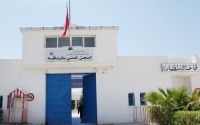Home » Tunisia » Press Releases » TUN - News » Tunisia: Sharp Deterioration in Detainee's Health Following Denial of Medical Treatment by Monarguia Prison
Shortly before his arrest, Gharsallaoui found he was suffering from an illness causing him a strong form of rheumatism, severe headaches and pain all over his body. His doctor had thus prescribed him a treatment and medical tests after a six-month period, in order to adjust the treatment accordingly. If, during the first months of his detention, his family made sure that he received his medicines regularly, after six months Gharsallaoui was refused his medical treatment and the tests prescribed by his doctor.
In mid-August, as a form of protest, Gharsallaoui went on hunger strike for about a week; the only reply his family and lawyers received to their repeated requests was the prison administration's consent to submit the victim to a blood test in late August. To this day, however, Gharsallaoui has neither received the results of the tests which should have been carried out, nor been authorised to resume his treatment, let alone to see a doctor.
As a consequence, his physical condition has significantly deteriorated since the interruption of his treatment, as his wife was able to notice, once more, during a recent visit. Among other things, her husband was unable to move, and had lost the use of his hand for several days. Assigned to an overcrowded and insalubrious cell, where 110 prisoners are crammed into a room originally designed for 40 people, Gharsallaoui is moreover required to share meals from a common dish with 15 other detainees, and has to take turns to sleep in a bed that he shares with two or three other detainees.
According to his wife, he is now unrecognisable: "From visit to visit, my husband loses weight every time a bit more, but he gives me very little information about his detention conditions and his state of health; I assume he wants to protect us," she explains.
Alkarama, which shares the Gharsallaoui family's concerns regarding his health asked the UN Special Procedures on human rights to urgently call upon the Tunisian authorities to make all efforts to provide Radhouane Gharsallaoui with proper treatment and medical care and to improve his prison conditions.
For more information or an interview, please contact the media team at This email address is being protected from spambots. You need JavaScript enabled to view it. (Dir: +41 22 734 1008).
 Algeria
Algeria Bahrain
Bahrain Djibouti
Djibouti Egypt
Egypt Iraq
Iraq Palestine/Israel
Palestine/Israel Jordan
Jordan Kuwait
Kuwait Lebanon
Lebanon Libya
Libya Mauritania
Mauritania Morocco
Morocco Oman
Oman Qatar
Qatar Saudi Arabia
Saudi Arabia Sudan
Sudan Syria
Syria Tunisia
Tunisia United Arab Emirates
United Arab Emirates Yemen
Yemen Other Countries
Other Countries






